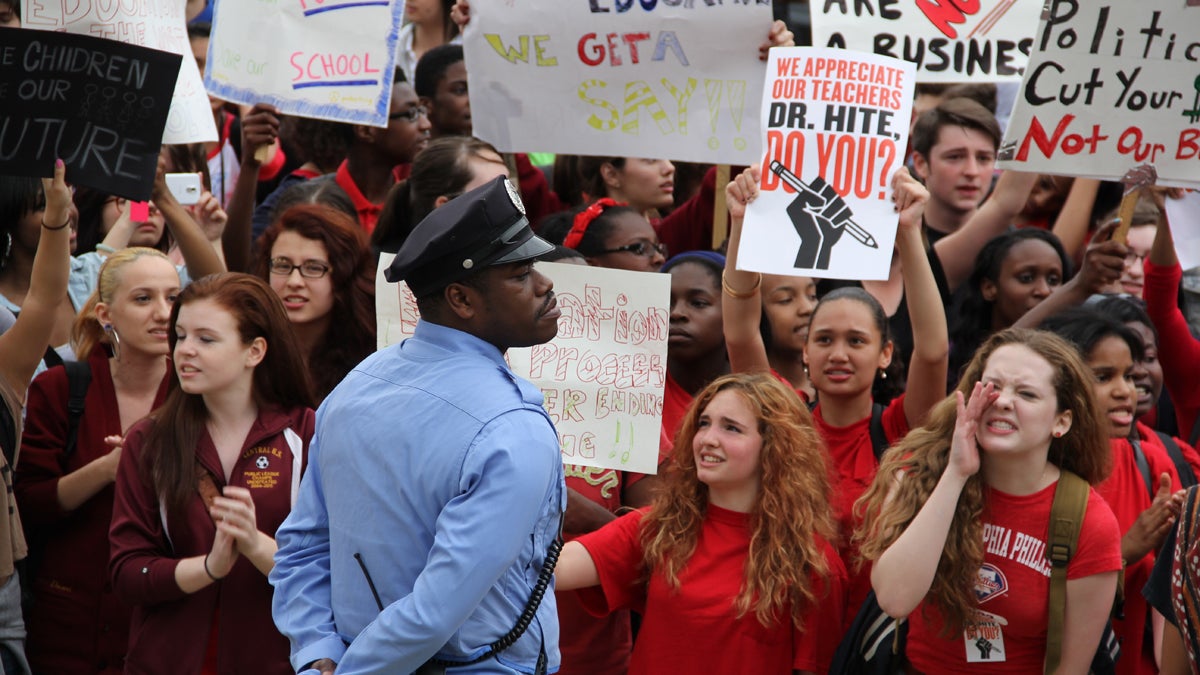Philadelphia School District failing to protect the rights of students with autism

Philadelphia high school students chant and scream in front of school district headquarters on North Broad Street on May 7 to protest budget cuts. (Emma Lee/for NewsWorks)
Why is the Philadelphia School District failing to fulfill their obligation to those with special education needs?
The following is a work of opinion submitted by the author.
Nearly 90 percent of all disabled children in any major metropolitan area require public schooling. The number of children being labeled as ‘disabled’ is increasing, but the Philadelphia School District has flat lined funding to the Special Education programs, despite not meeting annual yearly progress last year.
Why is the Philadelphia local education authority failing to fulfill their obligation to those with special education needs?
The Individuals with Disabilities Education Act ensures a “free and appropriate public education” and improvements in “educational results for children with disabilities.” I know this, in part, because I have a son who has autism.
Few options for students with autism
Like so many other children with autism in Philadelphia, my son attends public school. The reality is there are not many other options for him. Law requires any schools receiving government funding to accept children with disabilities, but not all schools are equipped to deal with them. In February of this year, it was widely reported that Philadelphia charter schools create significant barriers to enrollment.
Pennsylvania Governor Tom Corbett thought offering the Opportunity Scholarship Tax Credit would be a viable alternative, so that children could “leave ineffective schools,” but in order to qualify for the credit the area public school your child would attend must be on an annual list of 15 percent of the lowest performing schools in all of Pennsylvania.
“We just want the resources to do our job,” said Extended School Year Coordinator Jim Polisi on July 24, amidst the notification that there were to be hundreds of layoffs, including vital staff.
Unstable school district holds many lives in the balance
Some of those positions have since been restored, but even that day, the damaging effects of this funding rollercoaster were clearly taking its toll on everyone. There was a sense of a lack of stability as a distant entity known as the SRC seemed to arbitrarily decide the fates of so many people.
“It’s the teachers that make the schools feel like home, and the students are awesome,” explained Bernadette Dye, a life skills itinerant teacher. Dye split her time between two high schools last year, including Kensington Business and University City.
University City High School is one of the schools that will not be opening its doors in September.
“The morale and physical structures are depleted by the school closings and the drop in attendance,” Dye said.
The school district faces other depletions. Enrollment in all Philadelphia schools has dropped by nearly 4,000 students, while the population labeled as “disabled” remains at around 13 percent. Dye says special education teachers get very different kinds of students.
A growing need
The students in her classes, which consisted mostly of teenagers with autism, regularly attended and participated, because for those students school not only fulfills their need for education but their need for socialization in a comfortable environment. People like Polisi and Dye do their best to create that environment for their students with whatever funding they receive, but with close to one in every 50 boys being diagnosed with autism every year, a number that has doubled in the past two years, the rate of children requiring a special-needs education is only growing.
Tanya Regli, executive director of the Arc of Philadelphia, which works with Include Me From The Start and the School District to provide additional support to students with disabilities, echoed the earlier concerns with cuts in staff and school closings.
She noted that such dramatic changes are especially difficult for people with disabilities like autism because they are more sensitive to changes in their environment. Regli also mentioned that cuts have been seen “in the number of Philadelphia School District staff that provide direct services in the area of secondary transition,” or transition into life after high school.
The recently, and temporarily, restored staff positions within Philadelphia schools should be the call to action for all of us. It has been indicated that Superintendent William Hite sited student protests as a major influence for continuing to find funding for the school district, but these children should not have to take to the streets to defend their right to an education.
Will the public school students of Philadelphia need to take to the streets every few months to determine whether they will get a fraction of what would be considered adequate funding?
Will the SRC and School District continue to lay off people and rehire them within weeks, only to tell them their job is still in danger?
Which program will be cut, restored, or preserved this week?
This back-and-forth is creating unnecessary difficulties for those that work in the school system and the families served by it. It is the job of the school district and the school reform commission to demand the money so that each child in Philadelphia can receive an adequate education, just as they managed to find $33 million the other day and hold off on some layoffs until January, none of which will be going to special education.
—
Aja Beech is an occasional NewsWorks contributor.
WHYY is your source for fact-based, in-depth journalism and information. As a nonprofit organization, we rely on financial support from readers like you. Please give today.

